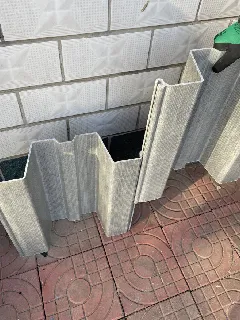loading...
- No. 9, Xingyuan South Street, Dongwaihuan Road, Zaoqiang County, Hengshui, Hebei, China
- admin@zjcomposites.com
- +86 15097380338
- Welcome to visit our website!
frp grate decking
Exploring the Benefits of FRP Grate Decking
Fiber Reinforced Polymer (FRP) grate decking has emerged as a popular choice for various industrial and commercial applications in recent years. Known for its superior strength, lightweight properties, and resistance to environmental factors, FRP decking has become the material of choice for many developers and builders. In this article, we will delve into the benefits and applications of FRP grate decking.
Exploring the Benefits of FRP Grate Decking
Another noteworthy benefit is FRP’s resistance to corrosion and chemical damage. Unlike metal or wood, which can degrade over time when exposed to harsh conditions, FRP is inherently resistant to a variety of substances, including salts, acids, and alkalis. This makes FRP decking an ideal choice for applications in wastewater treatment plants, chemical processing facilities, and coastal environments where exposure to saltwater is prevalent. The longevity of FRP materials can significantly minimize maintenance and replacement costs, offering a more sustainable solution in the long run.
frp grate decking

Safety is also a primary consideration in many commercial settings. FRP grate decking is designed to be slip-resistant, providing better traction for individuals walking or working on the surface. Its non-conductive properties ensure safety in environments where electrical hazards may pose a risk. Additionally, the lightweight nature of FRP makes it easier to maneuver and reduces the chances of injuries that can occur with heavier materials.
Environmental sustainability is another important factor driving the adoption of FRP decking. The manufacturing processes for FRP materials are increasingly becoming more eco-friendly, with options available that utilize recycled materials. Moreover, the extended lifespan and reduced maintenance requirements mean less frequent replacements and lower overall direct and indirect environmental impacts.
FRP grate decking is versatile, finding applications in a wide range of industries. It is commonly used in walkways, platforms, and catwalks in chemical plants, food processing facilities, and marine environments. Its customization options allow for various colors, sizes, and textures to meet specific project requirements.
In conclusion, FRP grate decking offers a plethora of benefits, from its impressive strength and lightweight properties to its resistance to corrosion, enhanced safety features, and environmental advantages. As industries continue to seek innovative solutions to improve efficiency and sustainability, FRP decking is sure to remain at the forefront of construction and design in the years to come.
-
The Rise of FRP Profiles: Strong, Lightweight, and Built to LastNewsJul.14,2025
-
SMC Panel Tanks: A Modern Water Storage Solution for All EnvironmentsNewsJul.14,2025
-
GRP Grating: A Modern Solution for Safe and Durable Access SystemsNewsJul.14,2025
-
Galvanized Steel Water Tanks: Durable, Reliable, and Ready for UseNewsJul.14,2025
-
FRP Mini Mesh Grating: The Safer, Smarter Flooring SolutionNewsJul.14,2025
-
Exploring FRP Vessels: Durable Solutions for Modern Fluid HandlingNewsJul.14,2025
-
GRP Structures: The Future of Lightweight, High-Performance EngineeringNewsJun.20,2025
